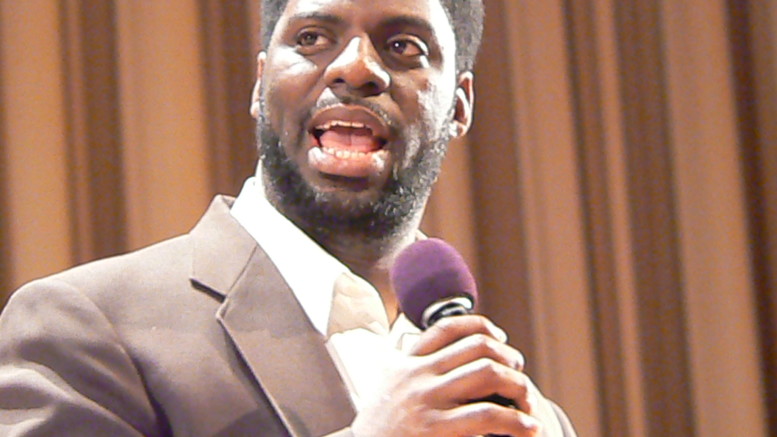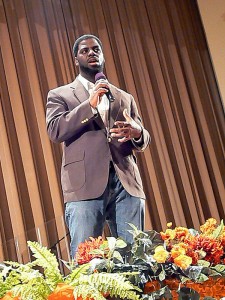by La Risa Lynch
Che “Rhymefest” Smith spoke October 20th about the music industry’s influence over rap music and his own inner struggles at redemption during a youth summit held at a far south side church.
Smith said he could not have achieved success as a Grammy award winning songwriter until he let go of past disappointments and demons in what he calls his resurrection.
“Everybody here is faced with a struggle. Nobody is perfect,” Smith told a mixed group of 7th through 12th graders at Christ Universal Temple, 11901 S Ashland Ave. “Everybody is dealing with some form of death right now, but it is time for your resurrection.”
Smith’s resurrection came from an unlikely source. It came in the form of an epiphany while penning the lyrics for Jesus Walks with Kanye West.
Smith explained that West takes an introspective approach to writing lyrics, especially the reworked version of the popular gospel tune.
“When you rappin’, you rap about the struggle, but then you have to have a resurrection at the end,” he explained. “You have to have the savior at the end and that is what brings people through the struggle.”
Both Smith and West went through personal struggles. For West it was surviving a car crash that forced him to have his jaw wired shut. For Smith, it came from growing up with a cocaine addicted young mother who was in an abusive relationship. But it was West’s accident that inspired the song Through the Wire, which put both him and Rhymefest on the map.
“There would be no Jesus Walks if there was no Through the Wire,” Smith said. “Think about what we are talking about — struggle, death, resurrection. Jesus Walks couldn’t be unless he [Kanye] went through a personal struggle, a personal death.
“I went through my personal struggle, my personal death with my mom and my life…,” he added, noting that his mom’s abusive relationship with men impacted his views on women.
“I would look … at how they misused and abused my mother and thought that’s the way it was. That’s the way men should treat women,” Smith said. “I started thinking of women in a crazy way because of what I see my mom go through.”
But Smith found his resurrection by forgiving his mom. For years he resented his mom’s lifestyle. But three years ago, he said his mom took responsibility for her failings. Smith noted his mom gave him a choice either to hate her or love her. He chose forgiveness. Now their relationship is stronger than ever.
“That was a decision, a choice that I had to make. Hating my mother was going to do nothing to change nothing,” he said, adding that his mother found her own resurrection. She got off drugs, went to school and became a registered nurse.
“We as young people are going to have to make decisions in our lives about what we are going to do with our lives…,” Smith said. “Your circumstances don’t determine your future. Your past don’t determine who you are going to be tomorrow.”
That all comes down to the choices people make, he explained. Even in the music industry, when artists have a chance to speak to thousands, they have a choice as to what message they want to convey. Smith said they can choose to speak about death by glorifying violence or resurrection by highlighting the school to prison pipeline.
“You telling me Chief Keef don’t love his grandmother. Why don’t we hear that part. Did y’all know that Lil Wayne has a degree in psychology? Why he’s not talking about that?” Smith said.
“They are not giving you the truth of the reality they see every day. They saw education. They saw a college degree. They’re selling you death on purpose,” he said.
Smith told the youth that many have already beaten the odds just by living in Chicago. Chicago, he explained, is one of the greatest cities in the world to produce powerful Black people in “the history of Blackdom.”
“Barack Obama wasn’t nothing until he came here and got his wings,” Smith said.” You are in the home of Blues; in the house of house music; the conscious of hip hop. Anything that you want to do comes from the struggle, the death and the resurrection that this city has put into you.”
Summit organizers hope youth attending the event heed Smith’s message. CUT’s Rev. Dr. Winston Johnson tapped Smith to keynote the summit because he echoes the event’s theme “The Power of Making Wise Choices: All of My Life Before Me.” Johnson said so many rappers like Tupac and Biggie Smalls end up like the lyrics they rap about.
“He teaches the power of the spoken word to move from hip hop to hip hope. Planning your future not your funeral. Rapping about life and not death,” said Johnson, the church’s director of youth and men’s ministry.
The summit conducted several breakout sessions on career readiness and conflict resolutions. One session focused on choosing words wisely which stressed how words have power to heal or destroy.
“I think that is the one that got me the most,” Courtney Danae Douglas, 14, said. “So many people say things that hurt other people just to make themselves feel better and to make people look lower.”
As a youth leader, she said she would encourage others to understand that words do have power.
Sterling Burnett, 14, was moved by Smith’s message, especially about the music industry. Burnett believes most artists don’t want to rap about negativity, but the music industry demands it because it sells.
Artists, he contends, rather “talk about struggles they had in their life, how to get out of them — stuff that really connects to other people.”

